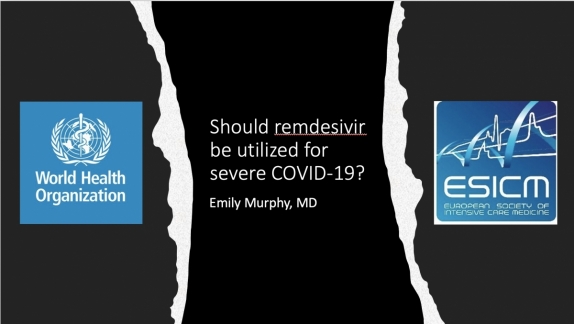Should remdesivir be utilized for severe COVID-19?

As the number of COVID-19 cases rises drastically and the global pandemic continues to change life as we know it, we are all hoping for news of effective treatment. Approximately 15 percent of patients infected with SARS-CoV-2 develop pneumonia requiring supplemental oxygen and an additional 5 percent progress to critical illness and acute hypoxemic respiratory failure. Although numerous drugs have been investigated, only dexamethasone has demonstrated improved survival in patients hospitalized with COVID-19 in a randomized controlled trial design.
Remdesivir is an RNA-polymerase inhibitor with in vitro activity against SARS-CoV-1 and MERS-CoV. While in vitro and animal data showed that early remdesivir administration decreased SARS-CoV-2 replication compared to control, the treatment effect disappeared when administration was delayed 8 hours after inoculation. Given that optimal efficacy in vitro was achieved with administration of remdesivir immediately after inoculation, one may have predicted that it would lack clinical utility in humans, where the median incubation period for SARS-CoV-2 is 4 days. Compassionate use of remdesivir for COVID-19 was approved by the FDA on May 1, 2020 while awaiting clinical trials examining its efficacy. We now have data from 3 randomized controlled trials to guide the use of remdesivir for severe COVID-19.
The first randomized placebo-controlled trial of remdesivir in the treatment of adults with severe COVID-19 was published in April 2020 by Wang et al. in the Lancet. In this trial, remdesivir was not associated with time to clinical improvement within 28 days of randomization (21 days in the remdesivir group versus 23 days in the placebo group). Moreover, mortality at 28 days was similar between the two groups (24% died in the treatment group vs 13% in the placebo group). There was also no difference in duration of mechanical ventilation. Interestingly, viral load decreased similarly over time in both groups and no difference in viral load was observed when stratified by duration of symptom onset prior to study drug administration. The median time from symptom onset to initiation of remdesivir in the trial was 10 days. The trial was terminated prior to reaching target enrolment due to the reduction in prevalence in Wuhan, China after institution of strict public health measures to limit COVID-19 transmission. The rate of adverse events was similar between the two groups.
Subsequently, the SOLIDARITY trial of 4 repurposed drugs (remdesivir, hydroxychloroquine, lopinavir-ritonavir and interferon) was launched by the World Health Organization with publication of interim results on October 15, 2020. The SOLIDARITY trial is the largest trial to date examining the efficacy of remdesivir. It was conducted in 405 hospitals in 30 countries randomizing a total of 11,255 patients, including 2750 allocated to remdesivir. None of the study drugs, including remdesivir, had any effect on mortality, need for mechanical ventilation (in those not already ventilated) or time to discharge.
Finally, the Adaptive COVID-19 Treatment Trial (ACTT-1) was a multicenter, double-blind, randomized, placebo-controlled trial published in the New England Journal of Medicine on November 5, 2020. The investigators enrolled 1062 patients hospitalized with COVID-19 and evidence of lower respiratory infection. Severe disease was defined as the need for mechanical ventilation, supplemental oxygen or a room air oxygen saturation of less than 94 percent in the presence of tachypnea (respiratory rate greater than or equal to 24 breaths per minute). Patients were randomized to receive remdesivir as 200 mg loading dose on day 1, followed by 100mg daily for 2-10 days or placebo for 10 days. The primary outcome was time to recovery stratified by disease severity. Patients in the remdesivir group had a statistically significant shorter time to recovery than placebo (median 10 vs. 15 days). The benefit was greater when initiated within 10 days of symptom onset and there was no difference in time to improvement if initiated after 10 days from symptom onset. Among patients not requiring non-invasive ventilation, high-flow oxygen, invasive ventilation or ECMO at baseline, there was a reduction in the need to initiate these forms of respiratory support. However, for those patients receiving mechanical ventilation or ECMO at enrollment there was no difference in the rate of recovery. Additionally, in patients receiving non-invasive ventilation or high-flow oxygen at enrollment, there was no difference in the duration of respiratory support. The most common adverse effects were reduction in glomerular filtration rate, increased blood creatinine level, pyrexia and anemia, but were similar between groups.
Following the final results of the ACTT-1 trial, the FDA issued approval for the use of remdesivir in patients with COVID-19. Despite FDA approval, use of the drug still remains controversial. On November 20, 2020 the World Health Organization recommended against the use of remdesivir in hospitalized patients with COVID-19. Additionally, the European Society of Intensive Care Medicine has recommended against the use of remdesivir in critical care units given the lack of outcome benefit among patients requiring non-invasive ventilation, high-flow oxygen, invasive ventilation or ECMO support.
Based on the results of these 3 large randomized controlled trials, it is hard to justify the ongoing widespread use of remdesivir as a standard therapy in critically ill patients with COVID-19.
References:
Beigel JH, et all. ACTT-1 Study Group Members. Remdesivir for the Treatment of Covid-19 - Final Report. N Engl J Med 2020 Nov 5;383(19):1813-1826. doi: 10.1056/NEJMoa2007764. Epub 2020 Oct 8. PMID: 32445440; PMCID: PMC7262788.
Dennis A. Remdesivir and COVID-19. Lancet 2020 Oct 3;396:952.
Eastman RT, Roth JS, Brimacombe KR, et al. Remdesivir: A Review of Its Discovery and Development Leading to Emergency Use Authorization for Treatment of COVID-19 [published correction appears in ACS Cent Sci. 2020 Jun 24;6(6):1009]. ACS Cent Sci. 2020;6(5):672-683. doi:10.1021/acscentsci.0c00489
Pan H et al. Repurposed antiviral drugs for COVID-19 – interim WHO SOLIDARITY trial results. MedRxiv doi: https://doi.org/10.1101/2020.10.15.20209817
“Remdesivir: Gilead.” Gilead Creating Possible, www.gilead.com/remdesivir.
